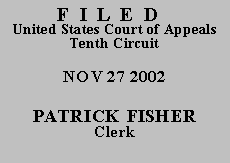

| UNITED STATES OF AMERICA, |
D.C. No. CR-01-108-T (W.D. Oklahoma) |
Before SEYMOUR, HENRY, and BRISCOE, Circuit Judges.
After examining the briefs and appellate record, this panel has determined unanimously to honor the parties' request for decision on the briefs without oral argument. See Fed. R. App. P. 34(f); 10th Cir. R. 34.1(G). The case is, therefore, ordered submitted without oral argument.
Michael Ray Warren appeals from his conviction for possession of a firearm after having been convicted of a crime punishable by a term of imprisonment exceeding one year (18 U.S.C. § 922(g)(1)). For the following reasons, we affirm Mr. Warren's conviction and sentence.
Prior to entering a plea of guilty, Mr. Warren filed a motion to dismiss for lack of jurisdiction, asserting that 18 U.S.C. § 922(g)(1), the felon-in-possession statute, is unconstitutional under the Supreme Court's rulings in Jones v. United States, 529 U.S. 848 (2000), United States v. Morrison, 529 U.S. 598 (2000), and United States v. Lopez, 514 U.S. 549 (1995). The district court denied Mr. Warren's motion. Pursuant to a written plea agreement, Mr. Warren entered a conditional plea of guilty, and reserved the right to appeal the district court's dismissal of this motion. Mr. Warren was sentenced to 120 months' imprisonment and to three years of supervised release.
On appeal, Mr. Warren reasserts that his conviction should be reversed because § 922(g)(1) exceeds Congress's authority under the Commerce Clause of the United States Constitution, U.S. Const. art. I, § 8. Mr. Warren acknowledges that this argument is "foreclosed" by our decision in United States v. Dorris, 236 F.3d 582, 586 (10th Cir. 2000) ("The decisions in Morrison and Jones give no reason beyond what was already present in Lopez to find § 922(g)(1) beyond Congress' Commerce Power."), cert. denied, 532 U.S. 986 (2001), which rejected the same argument. Rec. vol. IV, doc. 17, at 6 (Aplt's Br.). His counsel informs us that he has included the argument to preserve it for further review by the United States Supreme Court. Be that as it may, Dorris nonetheless compels us to AFFIRM Mr. Warren's conviction and sentence in the instant case.
Entered for the Court,
Robert H. Henry
Circuit Judge
*. This order and judgment is not binding precedent, except under the doctrines of law of the case, res judicata, and collateral estoppel. The court generally disfavors the citation of orders and judgments; nevertheless, an order and judgment may be cited under the terms and conditions of 10th Cir. R. 36.3.